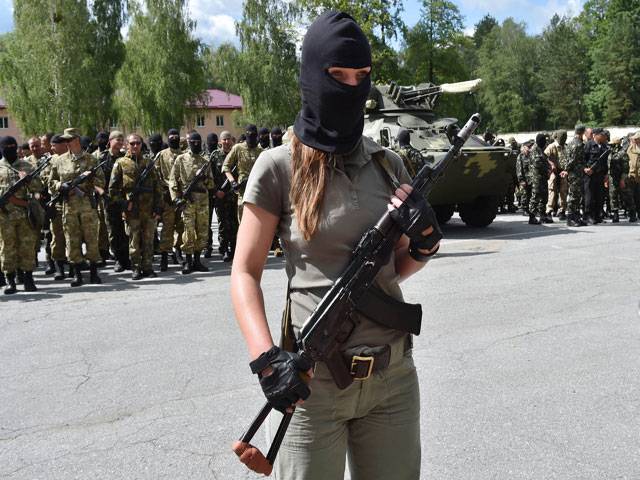IZVARINO, Ukraine : Ukraine pressed German Chancellor Angela Merkel and other Western allies on Monday to help end a pro-Russian uprising that has continued to rage in the industrial east despite Kiev’s unilateral ceasefire.
President Petro Poroshenko conducted another furious round of telephone diplomacy while his top diplomat prepared to outline the details of Kiev’s new peace plan to EU foreign ministers in Luxembourg.
Poroshenko will also sign an historic EU trade pact on Friday that crowns his May 25 election promise to make the decisive move westward - a move that is strongly opposed by Russia and lies at the heart of the current crisis.
The new president’s high-stakes peace push envisions talks with eastern representatives but not rebel leaders - a condition that Russian President Vladimir Putin says will not help end the 11-week revolt.
Putin threw his weight behind Poroshenko’s plan over the weekend provided it also leads to constitutional changes granting better protections to ethnic Russians who remain wary of the new government Kiev.
Russia further insisted on Monday that the week-long ceasefire Poroshenko ordered last week be extended over the long term.
Insurgent commanders have ignored Poroshenko’s overtures and continued waging their campaign to gain independence and eventually join Russia - a drive thus fur resisted by the Kremlin.
AFP reporters near the Russian border saw rebels push back and in some cases encircle government soldiers dispatched by Poroshenko to stem the flow of weapons and gunmen into the conflict zone.
“Their forces tried to blitz us (on Friday) but things turned out very differently,” a 54-year-old rebel commander named Oleksandr said in Izvarini, a small town about 50 kilometres (30 miles) east of the separatist stronghold of Lugansk.
“They are surrounded,” he claimed. “They have no food and water... and no chance to escape.”
Poroshenko told Merkel by telephone that the rebels had attacked government positions “more than 20 times” over the weekend in an apparent rejection of Putin’s call for both sides to halt fire.
A Ukrainian military spokesman said on Monday that six Ukrainian soldiers were wounded overnight.
Poroshenko told the German chancellor in a telephone exchange on Sunday that her involvement and that of other world leaders is “critically important to a settlement of the conflict in eastern Ukraine”, his office said.
Both Washington and its European allies have threatened Russia with biting sanctions against entire sectors of its economy should Putin fail to take substantial steps to de-escalate a crisis that has plunged East-West relations to a post-Cold War low.
US Vice-President Joe Biden told Poroshenko that Washington was “working closely with its G7 partners to prepare further economic sanctions against Russia if Moscow did not... stop the flow of arms and militants across the border and use its influence to publicly call on the separatists to lay down their arms,” the White House said.
And British Foreign Secretary William Hague said on his arrival for the EU meeting that Russia should be left in “no doubt” that it faced the threat of more punitive steps.
The Kremlin has firmly denied helping to arm the rebels despite Russian tanks and rocket launchers crossing recently across the porous frontier.
Many EU leaders are still trying to decipher Putin’s true intentions in what one analyst in Moscow called the Kremlin’s “cat and mouse game” with the West.
Putin has in recent days both come out in support of Poroshenko’s peace efforts and ordered fresh military exercises across a vast swathe of central Russia that immediately drew notice in Kiev.
Russia’s actions present “a bit of a mixed picture,” one EU diplomat said.
Some analysts believe Putin is still smarting from the loss of an ally in Kiev who could have brought Ukraine into a new alliance of post-Soviet nations being assembled by the Kremlin - and that he plans to keep Poroshenko’s government unsettled in order to maintain influence in the Russified southeast.
Putin appears determined to avoid actions that could lead to broader sanctions, but Washington would like to see more resolve from EU nations - chiefly Germany and Britain - that are still fearful of jeopardising important energy and financial ties with Russia.
Friday, April 19, 2024
Ukraine seeks Western help to end pro-Russia revolt

Caption: Ukraine seeks Western help to end pro-Russia revolt
9:58 PM | April 18, 2024
Ukraine warns of wider war ahead of US aid vote
April 19, 2024
3.5-magnitude earthquake hits Quetta
1:10 AM | April 19, 2024
US Ambassador Blome discusses bilateral ties with Foreign Minister Dar
1:08 AM | April 19, 2024
China to fully support Pakistan's counterterrorism efforts, says Ambassador Zaidong
1:07 AM | April 19, 2024
Seven dead as speeding passenger van falls into ditch in Muzaffarabad
1:06 AM | April 19, 2024
Hepatitis Challenge
April 18, 2024
IMF Predictions
April 18, 2024
Wheat War
April 18, 2024
Rail Revival
April 17, 2024
Addressing Climate Change
April 17, 2024
Justice denied
April 18, 2024
AI dilemmas unveiled
April 18, 2024
Tax tangle
April 18, 2024
Workforce inequality
April 17, 2024
New partnerships
April 17, 2024
ePaper - Nawaiwaqt
Advertisement
Nawaiwaqt Group | Copyright © 2024





